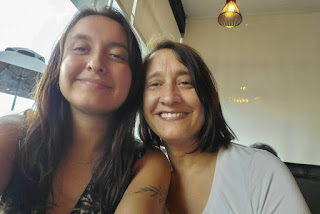This week, Dancose found herself waiting in vain behind
17,000 others in an online queue. New Zealanders desperate to return to their
home country are forced each week or so to enter a lottery for coveted beds in
quarantine hotels.
As part of its effort to minimize the spread of the
coronavirus, New Zealand requires all returning citizens and residents —
whether vaccinated or not — to spend 14 days isolating in a hotel run by the
military.
Because demand is far outstripping supply, New Zealanders
are being locked out indefinitely, despite the right of return enshrined in New
Zealand’s constitutional arrangements and in international law.
The quarantine system remains in place despite New Zealand’s
government acknowledging this week that it can no longer wipe out the virus.
The tight border controls, along with strict lockdowns and aggressive contact
tracing, ensured New Zealand eliminated each outbreak of the virus for the
first 18 months of the pandemic.
For most of that time, people were able to live without any
restrictions, going to work and filling sports stadiums. Only 28 people in the
country with a population of 5 million have died from COVID-19.
But an outbreak of the more transmissible delta variant in
August has proved impossible to extinguish, especially after spreading through
marginalized groups, including homeless people and gang members.
Yet the strict border measures remain.
For many trying to come home, it has been particularly
galling that sports stars, politicians and other selected high-flyers glide
through the system with guaranteed spots upon their return.
For one New Zealander, it took filing a lawsuit before she
could get home. Bergen Graham unexpectedly found out she was pregnant in March
while living in El Salvador.
Doctors told Graham her pregnancy was considered high-risk
because of her blood type. She filed six applications for an emergency spot in
quarantine, but was denied each time.
As Graham and her husband tried to get back, they flew to
Los Angeles, where they lined up alongside undocumented immigrants at community
clinics to get medical care.
They worried they would get deported from the U.S. when
their visa waiver entitlement expired, or that the delays would disqualify them
from traveling home because the pregnancy would get too far advanced. They
feared they would get stuck with a six-figure medical bill if they had the baby
in the U.S.
“It was inhumane. Everyone’s situation changes, and everyone
has the right to come home,” Graham said. “I felt like that right had been
taken away. It was the weirdest feeling.”
A London-based group called Grounded Kiwis helped her file
legal action in New Zealand asking for a judicial review of her case. Within 48
hours, the government made a U-turn and last month offered her an emergency
spot in quarantine.
Graham, whose baby is due in mid-November, said she’s
incredibly relieved to be back home in Auckland, but remains angry at what she
endured.
One of the founders of Grounded Kiwis is Alexandra Birt, a
29-year-old New Zealand lawyer based in London, who became concerned that people’s
rights were being breached.
Birt found time for research when she caught COVID-19
herself in July and took sick leave from work. She said New Zealand’s
quarantine system is broken and needs to change.
Many New Zealanders stranded abroad have also become
disheartened by the attitude of those back home, Birt said, some of whom seem
to have little sympathy for their plight and are content for the borders to
remain tightly sealed.
“People are feeling totally abandoned both by the government
and the New Zealand public,” Birt said.
New Zealand’s government says the quarantine system will be
vital in its virus response for the foreseeable future.
COVID-19 Response Minister Chris Hipkins recently announced
plans to add an extra quarantine hotel and begin a small trial that would allow
some fully vaccinated people to isolate at home.
“We want to assure Kiwis overseas that we are doing
everything we can to facilitate their safe return,” he said.
But the system may have already caused a symbolic loss. Amazon
Studios filmed one season of a television production inspired by “The Lord of
the Rings” in New Zealand, which has a long association with the books of
J.R.R. Tolkien.
However, Amazon said it decided to film the second season in
Britain to expand its production footprint there. Many people locally, however,
have pointed to the problems Amazon was having in getting its actors and crew
in and out of New Zealand.
For Dancose, the waiting to return home continues. When her
23-year-old daughter, who is studying in Montreal and has a history of
depression, reached out to her in August, Dancose had just accepted a new job.
But she knew she needed to be by her daughter’s side.
“When you are in New Zealand, the narrative is, don’t go,
despite whatever reasons you may have,” Dancose said. “I have no regrets,
though.”
Dancose has been logging on to a virtual waiting room, where
a few thousand places for returnees open up every week or two, often for slots
months in the future.
People are assigned a place randomly, and Dancose was about
15,000th in the queue, then 24,000th and another time 17,000th. She hasn’t come
close to getting a slot.
For now, she is couch-surfing in Montreal. A Canadian by
birth and a New Zealand permanent resident, Dancose has connections in both
countries.
Dancose said her daughter is doing much better. She said her
new employer has allowed her to work remotely for now, even though she’s
supposed to be interacting with people as part of her new job.
Dancose said she was double vaccinated in New Zealand before
she left, and remains dismayed that despite doing everything right, she’s still
not allowed to return home. -AP
